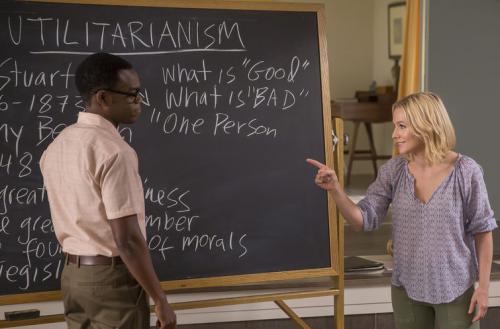
A wise man once wrote that you have to have a very high IQ to understand Rick and Morty. For that matter (and nothing really does), the same holds for The Good Place, whose third season is currently being released on Netflix, an episode a week. With its direct references to Aristotle, Kantian ethics and utilitarianism (yes, trolley dilemmas included), The Good Place is only the most outspoken of a slew of recent TV series with a focus on philosophy.
BoJack Horseman, another Netflix gem, is a dark tale of self-discovery and self-destruction. Its characters struggle to find happiness, a sense of belonging, or just some meaning in life. A further show dealing with existential questions is Rick and Morty, probably the most polished piece of epic fiction since Neil Gaiman’s graphic novel series The Sandman. Two absurdist anti-heroes travel across parallel universes, fighting against implausible creatures, fly-like humanoid bureaucrats and POTUS, because why not? As the lead Morty says, “Nobody exists on purpose; nobody belongs anywhere; everybody's gonna die. Come watch TV?”
Why is this rise in explicit philosophical messages in TV series happening? Is it a fluke in established trends of digital media content making? Or is it telling us something more profound about our society and the 'millennial' generation? (continues)
 | Philosophy Matters (@PhilosophyMttrs) |
|
I watch, therefore I am: the rise of philosophical TV .... buff.ly/2Eek0MB
| |
The political philosophy of The Good Place
The NBC sitcom The Good Place tells us it’s a show about ethics. One of the main characters is a professor of moral philosophy, the show constantly cites Ethics 101 names like Kant and Hume, and there’s even an entire episode devoted to “the trolley problem.” Although The Good Place’s metanarrative stops at intro-level ethics, the show itself does not. Instead, The Good Place shows us a fairly well-developed political philosophy. And it’s one that is largely more progressive than both its metanarrative about ethics and the politics of mainstream academic philosophy (and philosophers), which tend towards “both sides” Centrist Dad liberalism. Just as Michael tells Eleanor, Chidi, Tahani, and Jason that they’re in heaven because they were good people while subjecting them to some Bad Place torture, The Good Place tells us it’s a show about being a good person while presenting a pretty radical critique of contemporary society, showing us that everything from our obsession with individual performance metrics and the way we simultaneously empower and oppress women makes this The Bad Place.
The metanarrative that this show is about ethics (and not politics) reflects the way ethics is usually practiced in mainstream academic philosophy in the US. According to Charles Mills, philosophers in all subfields of mainstream academic philosophy generally practice ideal theory. Ideal theory “claims that starting from the ideal is at least the best way of realizing it”—for example, the best way to be a good person is to theorize on the assumption that the society we live in is just. The catch is, this doesn’t work. As Mills argues, “ideal theory can only serve the interests of the privileged, who, in addition—precisely because of that privilege (as bourgeois white males)—have an experience that comes closest to that ideal.” Philosophy’s ideals are modeled on the experiences of the most privileged people in the world (who also constitute an overwhelming majority of professional philosophers), and thus cannot account for or substantively address oppression and injustice. For example, the ideal of “autonomy…most famously developed in Kant’s writings…obfuscates the reality of care giving that makes any achievement of autonomy possible in the first place.” When philosophers start from the ideal of autonomy, they actually re-create gendered and racialized inequities regarding care and reproductive labor. Kant’s maxim of treating everyone as an end in themselves reproduces the patriarchal denial of personhood to women, who in their forced shouldering of reproductive labor are constantly treated as means. Think about it: somebody did Kant’s laundry... (continues)
The metanarrative that this show is about ethics (and not politics) reflects the way ethics is usually practiced in mainstream academic philosophy in the US. According to Charles Mills, philosophers in all subfields of mainstream academic philosophy generally practice ideal theory. Ideal theory “claims that starting from the ideal is at least the best way of realizing it”—for example, the best way to be a good person is to theorize on the assumption that the society we live in is just. The catch is, this doesn’t work. As Mills argues, “ideal theory can only serve the interests of the privileged, who, in addition—precisely because of that privilege (as bourgeois white males)—have an experience that comes closest to that ideal.” Philosophy’s ideals are modeled on the experiences of the most privileged people in the world (who also constitute an overwhelming majority of professional philosophers), and thus cannot account for or substantively address oppression and injustice. For example, the ideal of “autonomy…most famously developed in Kant’s writings…obfuscates the reality of care giving that makes any achievement of autonomy possible in the first place.” When philosophers start from the ideal of autonomy, they actually re-create gendered and racialized inequities regarding care and reproductive labor. Kant’s maxim of treating everyone as an end in themselves reproduces the patriarchal denial of personhood to women, who in their forced shouldering of reproductive labor are constantly treated as means. Think about it: somebody did Kant’s laundry... (continues)
No comments:
Post a Comment
Note: Only a member of this blog may post a comment.